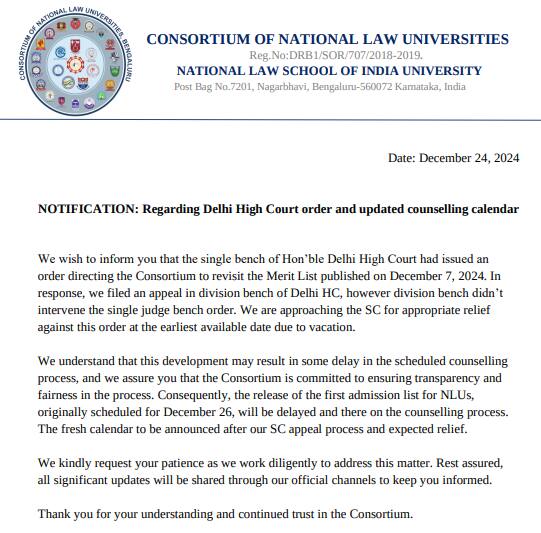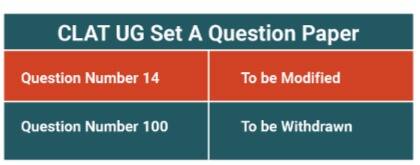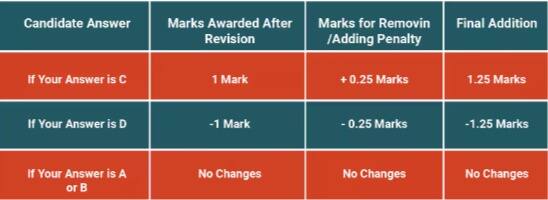Jindal Global Law School Admissions 2026
Ranked #1 Law School in India & South Asia by QS- World University Rankings | Merit cum means scholarships | Early Admissions (Pahse 2) Deadline: 28th Feb’26
The Consortium of NLUs has notified a delay in the publication of the first CLAT 2025 merit list that was originally scheduled to be published on December 26, 2024. The CLAT 2025 counselling has been postponed until further notice due to the order passed by the Divisional Bench of the Delhi HC on December 2024. The question on every aspirant’s mind is what’s next? The Consortium of NLUs has now decided to appeal in the Supreme Court against the HC order. Read on to get all the details about the delay in CLAT counselling 2025, including the controversy surrounding CLAT 2025 and the underlying reasons for the delay in counselling.


The cause of the delay in CLAT 2025 counselling are the numerous court petitions filed against CLAT 2025 answer key. In a judgement passed on December 24, the Divisional Bench of the Delhi HC upheld the verdict passed by a single judge of the HC four days earlier. As per the judgement, changes have been made to two questions in the CLAT 2025 Set A Answer Key which are as under -
The answer to question no. 14 has been changed to Option C instead of Option D as determined by the consortium.
Question no 100 has been withdrawn as none of the given options was found to be correct.
Ranked #1 Law School in India & South Asia by QS- World University Rankings | Merit cum means scholarships | Early Admissions (Pahse 2) Deadline: 28th Feb’26
Among top 100 Universities Globally in the Times Higher Education (THE) Interdisciplinary Science Rankings 2026
Changes will be made to corresponding questions in other sets of the CLAT 2025 answer key as well.

This change in the CLAT 2025 final answer key is likely to lead to a revision in the CLAT 2025 result and preparation of the CLAT 2025 merit list. It is for this reason that the Consortium of NLUs has postponed the counselling process.
Along with notifying the delay in CLAT 2025 counselling, the Consortium of NLUs has also informed that it will approach the Supreme Court against the HC verdict. The counselling is expected to start only after the case is heard in the Supreme Court.
The consortium of NLUs has further said that it will provide regular updates in the matter through notifications on the official website. So, candidates must keep checking the consortium’s website for any developments.
The Delhi HC order can impact CLAT 2025 score in several ways depending on whether candidates attempted the two questions or not. The CLAT 2025 score can go up by 1.25 marks or it can go down by 1.25 marks as well depending on which answer the candidate marked in the exam for the two questions.
The CLAT marks vs rank analysis shows that even one mark can change CLAT 2025 rank drastically and decide whether a candidate gets a seat in the premier NLUs. The graphics below explain the possibility of a change in marks in detail.


On Question asked by student community
Since you have not specified your category, I will answer for all categories. A CLAT rank of 38169 (typically 40-45 marks) makes admission to top NLUs difficult. For General candidates, chances are nil. Even for OBC, SC, and ST categories, admission is primarily possible only through state domicile quotas or
After the CLAT results are declared, candidates participate in a centralised online counselling process managed by the Consortium of NLUs. Eligible candidates register on the official portal, submit their NLU preference list , and pay a counselling fee. Seat allotment happens across multiple rounds based on rank, category, and preferences,
Hi, you can apply for admissions in Nirma University, NFSU Ahemdabad, Alliance, IPU University and affiliated instiutes (in case you are reserved category candidates), UPES Dehradun, BITS Law School etc.
Start preparing for CLAT by first understanding the exam pattern and syllabus, which includes English, Current Affairs, Legal Reasoning, Logical Reasoning, and Quantitative Techniques. Make a simple daily routine and begin with basics read newspapers regularly for current affairs, practice comprehension passages for English and legal sections, and solve basic
Hello,
With a CLAT AIR of 33599 and SC category rank of 2103, and being a Delhi domicile, your chances at IP University (GGSIPU) are moderate to good, especially in later counselling rounds.
Based on previous year trends, some IPU-affiliated law colleges have closed at higher SC category ranks, so
Among top 100 Universities Globally in the Times Higher Education (THE) Interdisciplinary Science Rankings 2026
NAAC A+ Accredited | Among top 2% Universities Globally (QS World University Rankings 2026)
Excellent curriculum; an impressive range of electives, besides core law courses. Up to 100% merit scholarship on a first-come, first-served basis
Admissions open for B.A. LL.B. (Hons.), B.B.A. LL.B. (Hons.) and LL.B Program (3 Years) | School of Law, MRU ranked No. 1 in Law Schools of Excellence in India by GHRDC (2023)
Moot Court | Mock trials | Legal Aid Clinic
NAAC A++ Accredited | Ranked #11 by NIRF